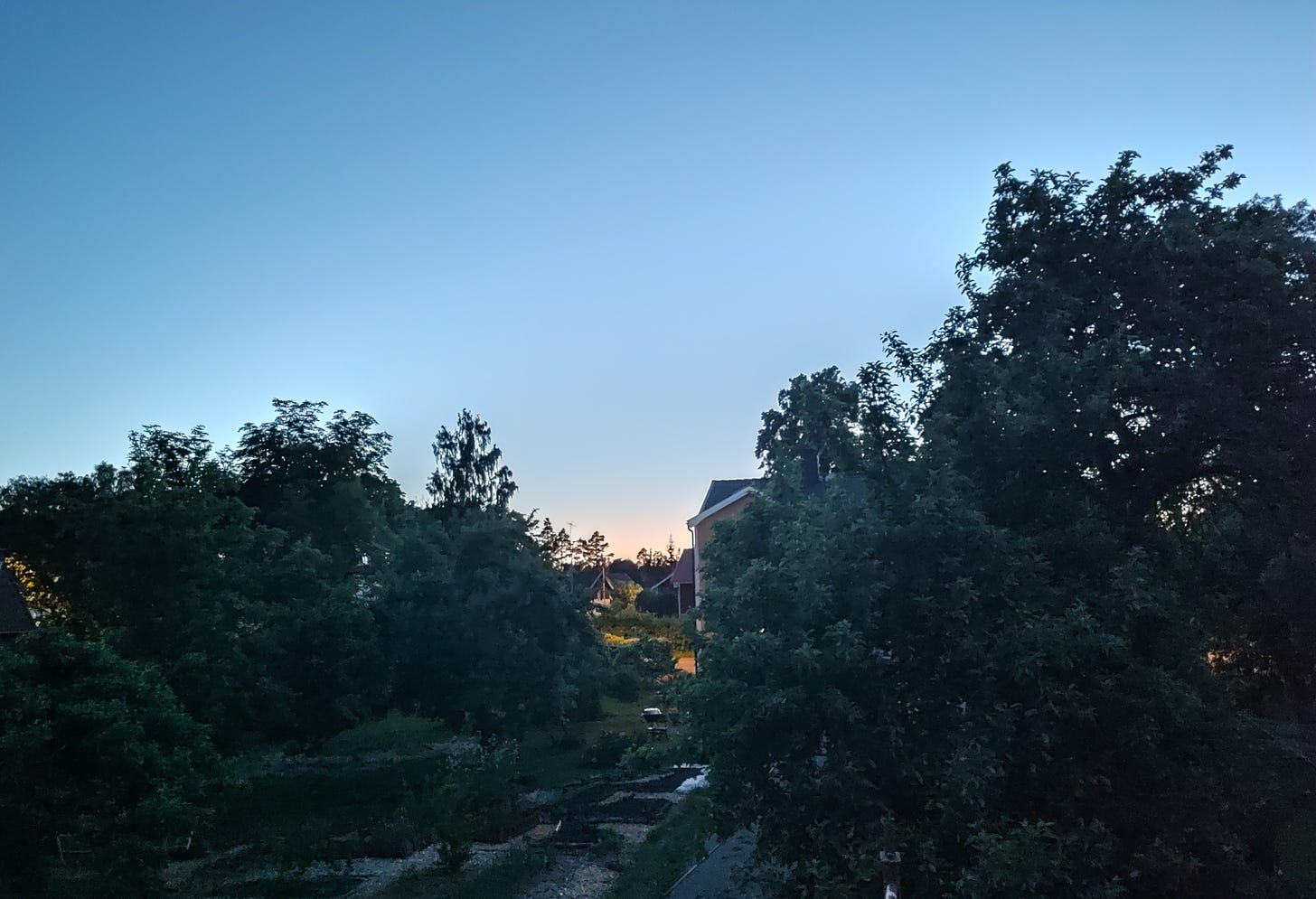Early on in Sunday’s conversation with Bhav Patel, I read out a few lines from an interview with the actor Mark Rylance, talking about his role in Inland, a film he describes as an “ecological parable”. Here’s how the interview ends, as he offers an image of where we find ourselves:
It’s the time now for us to come down the dark side of the mountain and not keep going towards the light that represents power over everything […] I know that feeling very well from these hikes in the mountains. Late in the day, you’re trying to get down to the river to make a camp, and it’s hairy – you’re likely to twist your ankle with a heavy pack on your back as the light fades. But that image is very true for me, and for where we are right now. We’ve got to come down into the darkness and into all the things that are chaotic. It’s time to admit we’re powerless.
Two things struck me, when I first read that interview.
The first is that this is a powerful reworking of an image I’ve been travelling with for a long time.
had already landed on Dark Mountain as a name for a journal when the two of us came into conversation and then began to write a manifesto. The image had come to him from a poem by Robinson Jeffers. Around the same time, Paul was working with Mark Rylance and Jez Butterworth, as they developed the script for Jerusalem. So there’s a weave of connections here that go back to the beginnings of the Dark Mountain Project. The gift of an actor is to bring life to lines that you have spoken many times before – and that’s what I experienced, reading that interview. Rylance takes up the image of the dark mountain and hands it forward with an unexpected freshness, as a description of our collective predicament.The second thing that strikes me is that, as he does this, an alignment is revealed between Dark Mountain and the Twelve Steps of Alcoholics Anonymous. “It’s time to admit we’re powerless,” Rylance says, and this is the message of the opening section of the manifesto Paul and I wrote, but it’s also the first words of the First Step: “We admitted we were powerless…” This got my attention because for several years I had been carrying a question about what “an AA for a whole culture” could mean – but until this point, I hadn’t noticed how this question ran straight back to the beginnings of Dark Mountain. I mean, literally, that early essay of Paul’s which brought our project to many people’s attention was called ‘Confessions of a Recovering Environmentalist’! More than this, when we were attacked for having “given up”, I’d tried to articulate a visceral sense that “giving up” can be a necessary move, a starting point for a paradoxical kind of change – and in the alignment between our project and this movement for which surrender is the first step, I came to understand better what I had been trying to say.
For more on this, watch How to Give Up, a talk I gave last year that is followed by a roundtable with Bayo Akomolafe, Ciclón Olivares and Maya Kóvskaya.
This is the background to Sunday’s conversation with Bhav Patel, where we spoke about his experiences with Initiatives of Change, an organisation that traces its roots to the Oxford Group, which was also the source for the origins of Alcoholics Anonymous. What’s significant about this story for me is that it places the twelve-step movement within a larger history that was always directed to the world at large, and not only to those seeking recovery from personal addiction.
As one of the participants said during Sunday’s discussion, addiction looks like a good description of the state of our whole societies, when our unsustainable dependency on growth and extraction is brought into view. The difference is that the work of recovery in AA allows individuals to find a way to function within that wider society, while the collective addictions which underwrite the functioning of these societies call for a collective process of recovery that is harder to imagine. Still, I think there are clues in the kind of conversation we had on Sunday, and in other threads that have been running through this season of conversations.
Thanks to everyone whose support as paying subscribers has made this season possible. As with earlier sessions, the full recording is available to paid subscribers, along with an audio recording which you will find below the paywall.
It’s Midsummer’s Eve today, here in Sweden, and this feels a timely threshold at which to bring the work of the first half of 2024 to a close. I’ll be on the road for the next couple of weeks, gathering with the friends of Ivan Illich in Germany, then heading to the UK for the Spiritual Ecologies summit at St Ethelburga’s in London and to give a keynote at the LSE/Cambridge summer school on Religion and Climate Futures. No doubt there will be more to report along the way, and I look forward to making further invitations in the second half of the year, and sharing news of further adventures. I’ll also be taking a few weeks off in July and early August, so I’ll set up a few older pieces of writing to share with you during that break.
Meanwhile, thanks again to all of you who are reading, watching, sharing and supporting my work here. I took the photo below just after midnight, from the scaffolding on the front of the Red House, looking north. It comes with good wishes to you all at this turning of the year.
DH


















